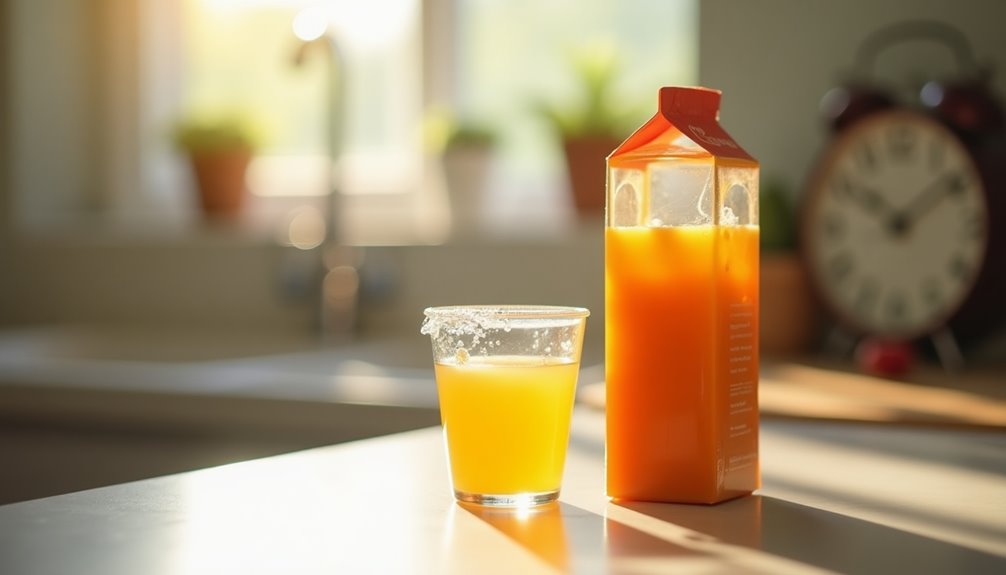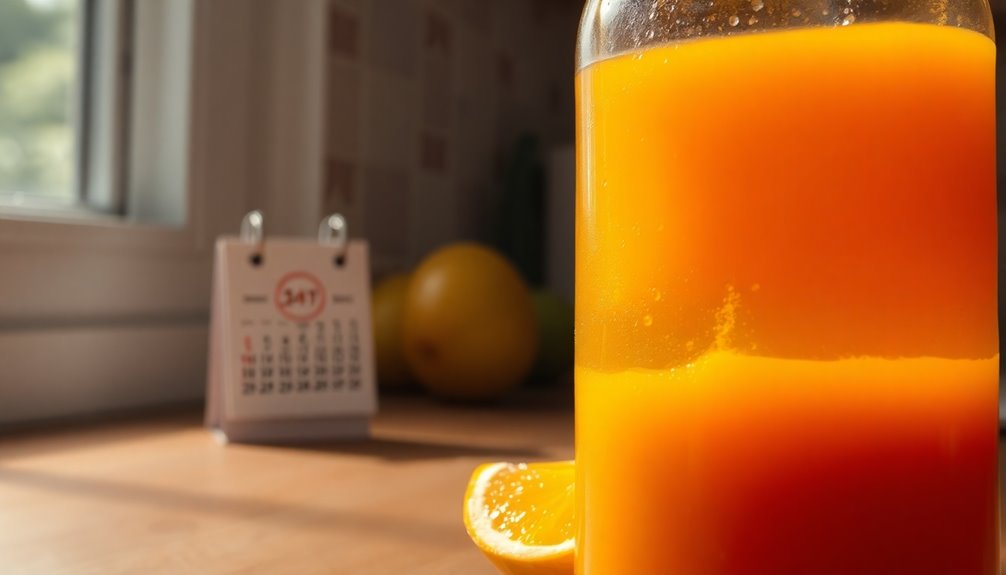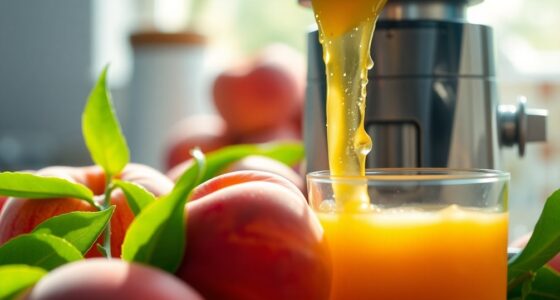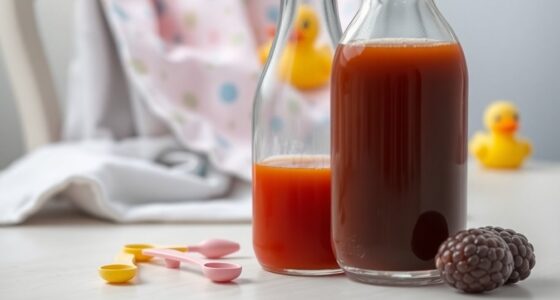After opening, store-bought refrigerated juice typically lasts about 7 to 10 days, while shelf-stable juices may last longer. Freshly squeezed juice, on the other hand, should be consumed within 2 to 3 days for the best flavor. Always check for signs of spoilage like a sour smell or mold. Proper storage can help maintain freshness, and knowing how to handle leftovers can further extend your juice's lifespan. Discover more tips on maximizing your juice experience!
Key Takeaways
- Refrigerated orange juice lasts about 7 to 10 days after opening, while shelf-stable varieties may last longer.
- Freshly squeezed juice should be consumed within 2 to 3 days for optimal freshness.
- Always check expiration dates for store-bought juices to ensure safety after opening.
- Signs of spoilage include sour smell, cloudy appearance, and mold; discard any spoiled juice immediately.
- Freezing leftover juice can extend its freshness for several months if stored in airtight containers.

Have you ever wondered how long your juice stays fresh after you crack it open? It's a common concern, especially when you want to make the most of your delicious drink. The shelf life of juice varies based on several factors, including the type of juice, how it's been processed, and how you store it after opening. Knowing these details can help you avoid wasting juice and ensure you're consuming it at its best.
When it comes to store-bought juices, you'll find a significant difference between types. For instance, once you open a container of refrigerated orange juice, it can last around 7 to 10 days, depending on the storage conditions. If it was shelf-stable before opening, that might extend the shelf life a little longer. However, be mindful of the expiration date printed on the container. Even though the juice may still taste good, it's wise to respect those dates for safety reasons.
Fresh juice, on the other hand, has a much shorter lifespan. If you've made some freshly squeezed orange juice or any other fresh juice, it typically remains good for just 2 to 3 days when stored in a cool refrigerator. This rapid decline in freshness means you'll want to enjoy it quickly. If you notice any signs of spoilage, like a sour smell, cloudy appearance, or even mold, it's best to discard the juice immediately. Trust your senses; they're your best guide to freshness.
If you ever find yourself with leftover juice, don't fret! Freezing leftover juice can be a fantastic way to extend its freshness for several months. Just make sure to store it in airtight containers to prevent freezer burn. Once you defrost your juice, though, remember it should be consumed within 3 to 5 days to ensure it maintains its quality. This method is great for those times when you want to prep ahead or simply can't drink it all at once.
Ultimately, understanding how long your juice lasts after opening can save you both money and disappointment. Whether it's orange juice or any other variety, keeping an eye on the best by date and the signs of spoilage will keep you enjoying your beverage without worries.
Frequently Asked Questions
How Long Should You Keep Juice After Opening?
When you open juice, it's best to consume it within a specific timeframe to ensure freshness.
For store-bought juice, aim to drink it within 7 to 10 days. Freshly squeezed varieties should be enjoyed even sooner, usually within 2 to 3 days.
Always check for signs of spoilage, like off smells or discoloration, before sipping.
Storing it properly in the fridge will help maintain its quality longer.
Can You Drink Juice After 7 Days?
Imagine pouring a glass of juice, its vibrant color sparkling in the sunlight.
After 7 days, though, you should tread carefully. While you might be tempted to take that sip, it's wise to pause and inspect.
Look for any off-smells, cloudiness, or mold lurking in the bottom. If you spot anything unusual, it's best to toss it.
Your health's worth more than a questionable drink, so stay safe and keep an eye out!
Can I Drink Orange Juice 2 Weeks After Opening?
You shouldn't drink orange juice two weeks after opening. It's likely spoiled by then, even if it looks okay.
Check for signs like a sour smell, off taste, or mold. If the carton feels bloated, it's best to toss it.
To keep your juice fresh, always store it tightly sealed in the refrigerator and consume it within the recommended timeframe.
Your health's important, so don't take chances with expired juice!
How to Tell if Juice Has Gone Bad?
To tell if juice has gone bad, start by checking for any unusual signs.
If the juice looks cloudy, has fizzing bubbles, or a boozy smell, it's likely fermented. A vinegar-like taste or sour odor is another red flag.
Look for mold or lumps, which clearly indicate spoilage. Discoloration can also suggest it's lost freshness.
Always check the expiration date and inspect your juice regularly to ensure it's safe to drink.
Conclusion
In conclusion, after opening, juice typically stays fresh for about 5 to 7 days when stored properly in the fridge. Think of it like a ticking clock—the moment you pop that cap, the countdown begins. To enjoy the best flavor and quality, be sure to sip it up before it starts to turn. Remember, freshness is key, so don't let your juice linger too long or you might end up with more sour than sweet!
Cindy thoroughly researches juicing trends, techniques, and recipes to provide readers with practical advice and inspiration. Her writing style is accessible, engaging, and designed to make complex concepts easy to understand. Cindy’s dedication to promoting the advantages of juicing shines through her work, empowering readers to make positive changes in their lives through the simple act of juicing.











